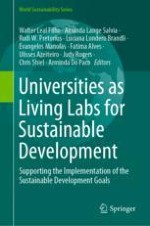2020 | OriginalPaper | Buchkapitel
Interdisciplinary Cooperation and Collaboration in Undergraduate Sustainability-Based Programs: A Canadian Example of Environment and Urban Sustainability (EUS)
verfasst von : Michal Bardecki, Andrew Millward
Erschienen in: Universities as Living Labs for Sustainable Development
Aktivieren Sie unsere intelligente Suche, um passende Fachinhalte oder Patente zu finden.
Wählen Sie Textabschnitte aus um mit Künstlicher Intelligenz passenden Patente zu finden. powered by
Markieren Sie Textabschnitte, um KI-gestützt weitere passende Inhalte zu finden. powered by
